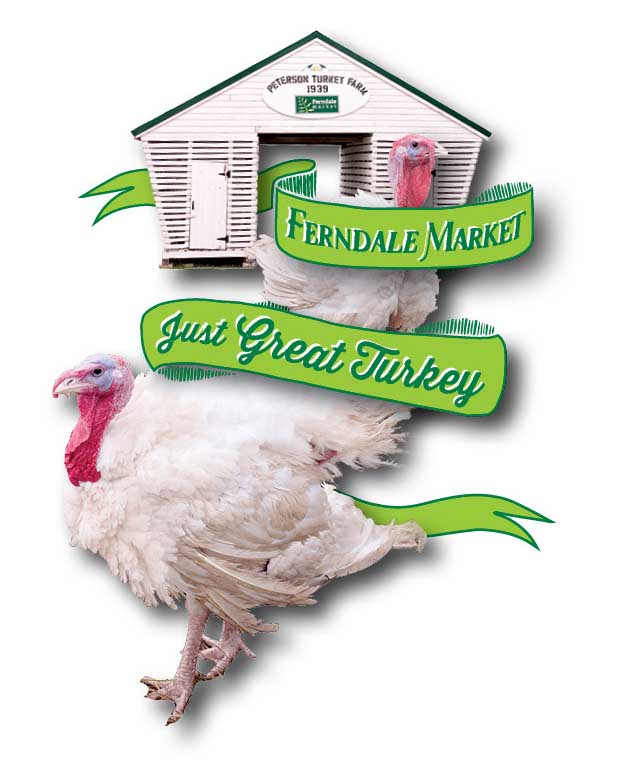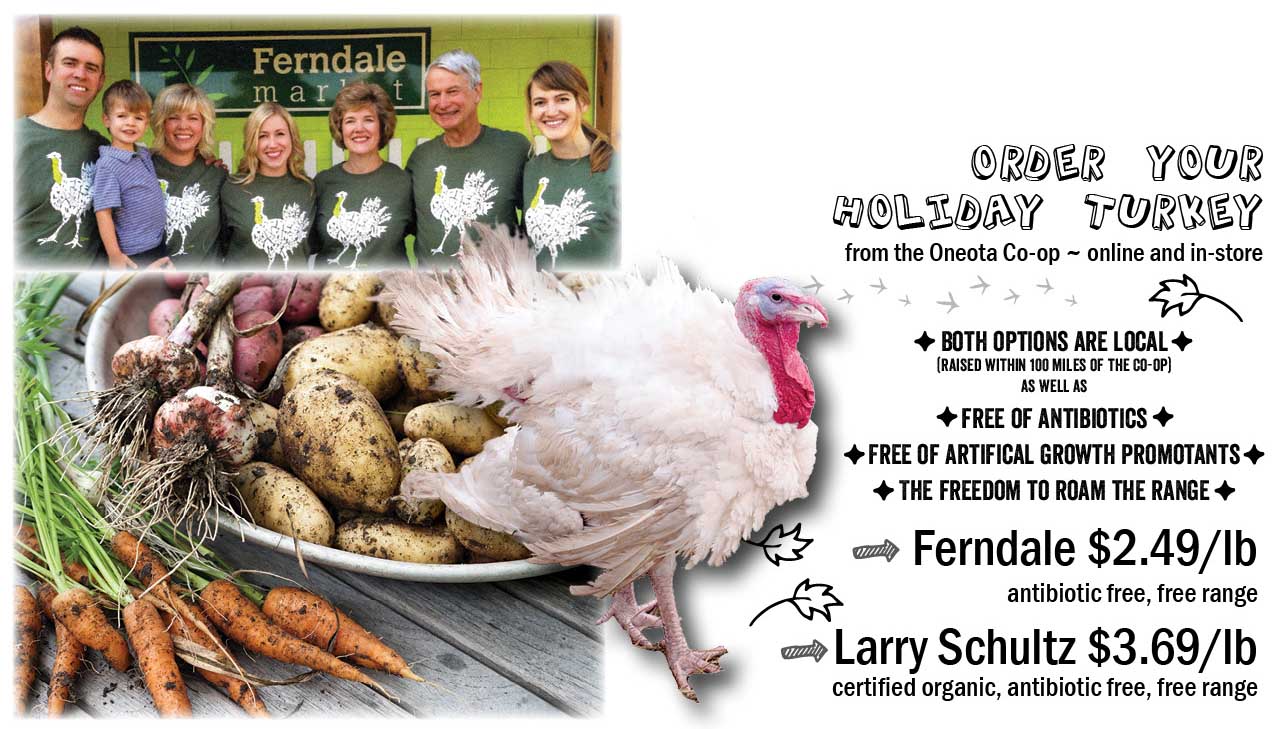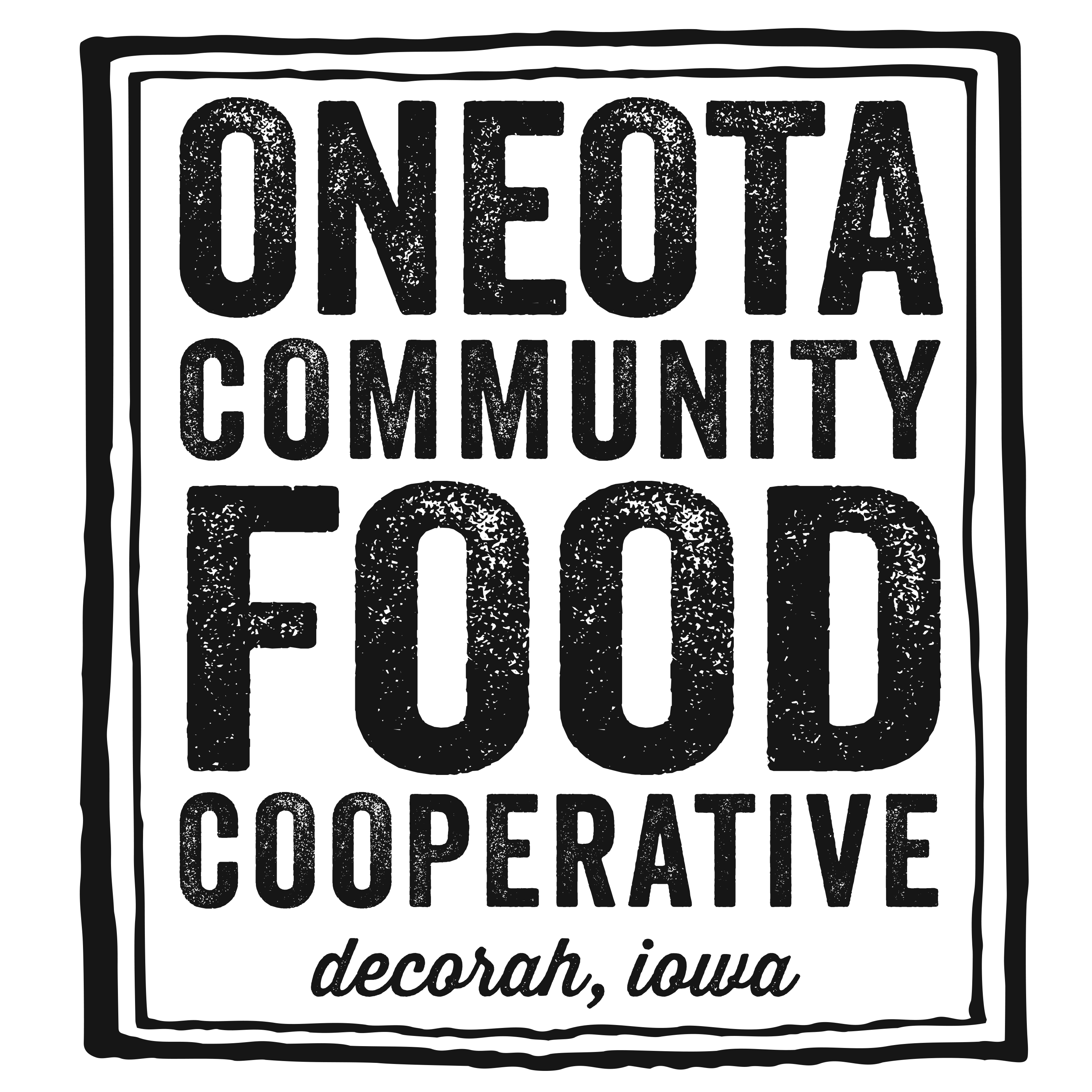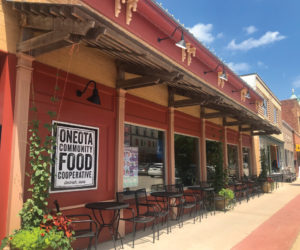
 By: Nate Furler, Marketing and Outreach Manager – September 2016
By: Nate Furler, Marketing and Outreach Manager – September 2016
At the Co-op we love to learn as much as we can about our producers – especially our local producers. This past July, Kaija (the Co-op’s Graphics Coordinator) and I were fortunate to attend a farm tour at one of our local turkey producers. It was a great experience and this article and these photos are the result of a long relationship that the Co-op has been fortunate to have with John and Dick Peterson, the second and third generations of Ferndale Market.
Ferndale Market’s farm and store are located in Cannon Falls, Minnesota. This lands their organization spot-on the Oneota Co-op’s geographic definition of local – within 100 miles of the Co-op as the crow flies. The farm, established in 1939 as Peterson’s Turkey Hatchery, is in its 77th year of business.
In the beginning, John’s grandfather, Dale Peterson, ran a turkey hatching operation. These days John and his father Dick are responsible for the fine, fully-grown turkeys that grace the shelves of our fresh meat and freezer coolers in their many forms. From ground turkey to sausages and whole birds, the Petersons supply the Co-op with a wide assortment of antibiotic-free, free-range turkey products.
John was raised on the family farm and returned to the farm after studying at Augustana College. It wasn’t a move he planned on, but it turned out to be fulfilling for him, his wife, and their family.
The Ferndale name harks back to the days when John’s grandfather met Fern, John’s grandmother. The name is a testament to what John’s grandfather and grandmother created, his father and mother continued, and now John and his wife continue to this day – with high hopes for the future.
This beautiful farm is home to some 160,000 birds in any given year. The number pales in comparison to the roughly 45 million turkeys that are raised in the state of Minnesota annually. However, their operation seems anything but small sitting in the field surrounded by these curious, talkative birds.
The land is ideally suited for doing what Ferndale Market does – raising turkeys without the use of antibiotics and growth promotants – from the day of hatching to the end of the turkey’s growing cycle at roughly 4 to 5 months. From egg to plate, birds displaying the Ferndale Market branding represent the dedication the Petersons have to antibiotic free flock management and natural growth practices.
The turkeys are custom-hatched for Ferndale by a facility in Iowa. Once moving to the Ferndale farm (within 24 hours of hatching), these chicks spend the beginning stages of their life in brooder barns where they are kept on fresh sawdust shavings and hand fed and watered with the temperature in the barn north of 95 degrees. It is hot but vital work to ensure the turkeys get a successful start in life.
As the days go by, the temperature is slowly lowered in the barn as determined by the growth of the chicks. At roughly one month old, the birds are transitioned to a regular-style barn with increased ventilation and a chance to run around outdoors.
At roughly two months of age, the turkeys are moved out to pasture. The pasture soil is quite sandy, which is ideal for usage as a pasture for the birds being that it drains water extremely well. Standing water and pools of mud can lead to adverse conditions for the birds.
The pasture in its entirety is the shape of a long rectangle, stretching far into the distance as we sit on one end of the property. Each week the birds are moved further and further down the pasture, giving them access to fresh, tall grass. This system allows the bare, previously inhabited pasture to rejuvenate, utilizing the fresh bird droppings as energy to grow new tall grass. This pasture is utilized over and over again, optimizing the cycle of energy exchange between the birds and the land.
As we sit in the pasture (on the hayrack) in the midst of the Toms, I am mesmerized by the curiosity of the birds. Turkeys are a curious species, though their curiosity sometimes is mistaken for aggressiveness. As the hayrack drives across the pasture, the entire field migrates with us, eventually stopping when we do. The birds continue to mingle around the hayracks while John proceeds to tell us the finer points of raising their flock at this stage.
The birds have access to fresh water at all times and a diet of corn and soy grain. This feed, free of synthetic growth promotants, ensures the overall health of the birds in a natural timeline. If you are like me and have seen the sadly gruesome videos on the mistreatment and inhumane practices of some large-scale, conventional producers, Ferndale is a breath of fresh air. Their birds not only have access to roam, but also can actually mingle and wander because their legs are strong and their bodies are proportionate to their muscle development.
As John answers questions from the group, he gets the one that I know many will be interested in. Is the feed certified organic? John flatly states that Ferndale does not use certified organic corn and soy feed for their turkeys purely due to the price of the feed. With the cost of feed contributing to 75% of the cost of raising a turkey, Ferndale chooses to focus their efforts on providing the best turkey at a price that more people can afford. This is in-line with the mission his grandfather had when starting the business. He acknowledges foodservice representatives from schools sitting next to us on the hayracks, all nodding their head in great appreciation for Ferndale’s decision.
The birds still surround the hayracks with one, two, or ten of them puffing their feathers in hopes of attracting a mate. Their heads are a transitional bluish purple color. Their reddish snoods a stark contrast to their white feathers and the rich green pasture. To those familiar with the oftentimes dark brown and robustly colored turkey historically portrayed, these birds may be surprisingly different, but they are every bit as iconic.
The breed of turkey raised by Ferndale is typical of most turkey producers in the region. Broadbreasted White is a hybridized version of the original Broadbreasted Bronze that John’s grandfather and father raised. Why the change? Consumer demand and the consistent coloring of the bird’s skin due to a lack of darker colored feathers which was typical of the Broadbreasted Bronze. In addition, the Broadbreasted White has a higher ratio of white meat to dark meat – again, what the average consumer prefers.
As you may have already guessed, a male turkey is called a “Tom” while the female is referred to as a “Hen.” We happen to be in a field of Toms. Toms are considerably larger than Hens and are used predominantly in making ground or processed meats such as deli meats and parts. The Hens are the typical holiday table bird due to their smaller size. When was the last time you cooked a 40 pound bird for a gathering?
Once out to pasture, these birds have perimeter fencing that protects them from most predators – including coyotes, raccoons, skunks and even owls when the birds are small.
Protection from the weather is also a concern. Summer months can be very hot, and the worst predicament for them is a hot, still day. With little to no potential for man-made air circulation in the pasture setting, the best line of defense for John and the crew is to spray the turkeys with cool water. This serves two purposes – urging the birds to get up and move around, and helping to cool them. It is one of the prices of raising birds on pasture, but is one that John, Dick and their crew welcome compared to cramming the birds into a barn and turning up a fan.
As I said earlier, Ferndale turkeys spend their entire life free of antibiotics and synthetic growth promotants and have access to the outdoors as soon as they are old enough. John explains that when health issues arise, the first line of defense is homeopathic and herbal remedies. However, occasional problems arise and the health and wellbeing of the birds are jeopardized in spite of these remedies. In these special cases, John and the crew will resort to the use of antibiotics to preserve the wellbeing and comfort of the bird. However, these animals are removed from the population and no longer are sold under the Ferndale brand.
Lack of access to a processing facility often prevents small, independent producers from finding ultimate success at these numbers. Ferndale is fortunate to have access to Turkey Valley Farms, a grower-owned processor located in Marshall, Minnesota – 3 hours west of Cannon Falls.
When you purchase a Ferndale Market antibiotic-free, free range turkey for your table, you can be sure there is no brining solution (salt & water) added to the bird. You purchase a turkey, and that is what you get 100% of the time.
Our thanks to John and Ferndale Market for extending the invitation to us at Oneota and we look forward to a long relationship of providing the best antibiotic free, free range turkey a person can buy, AND that is local to us here at Oneota.
Look for Ferndale turkey products in our refrigerated meat case and frozen meat case all year round and whole turkeys during the holiday season.



